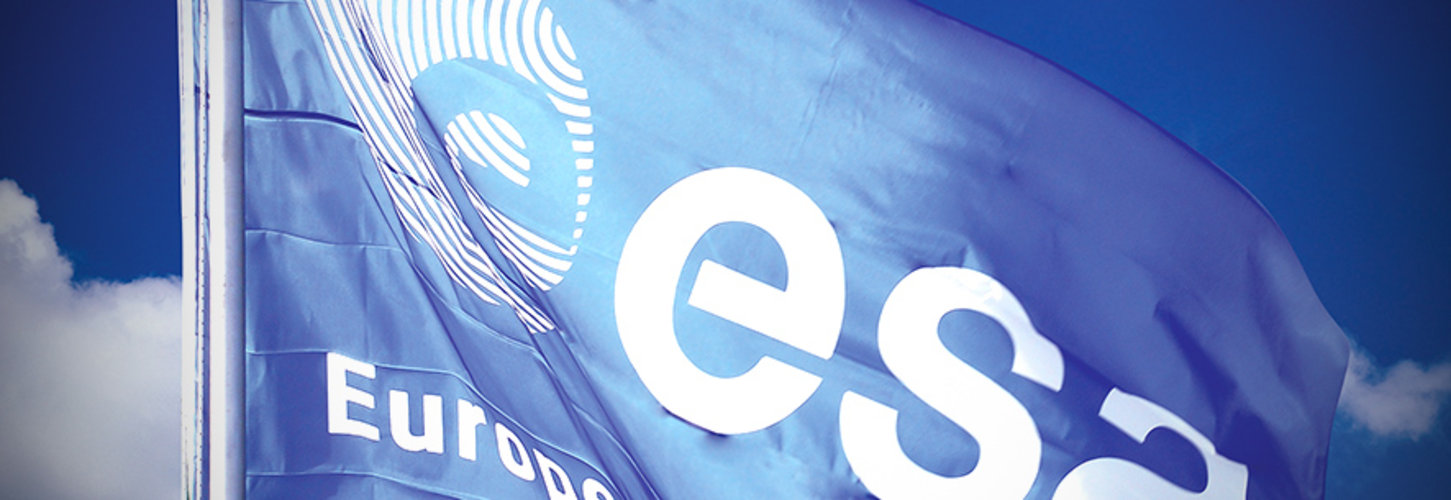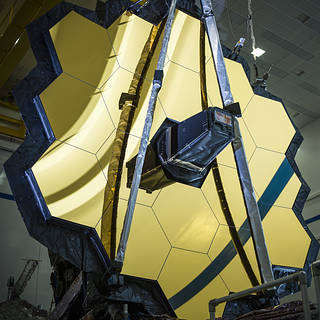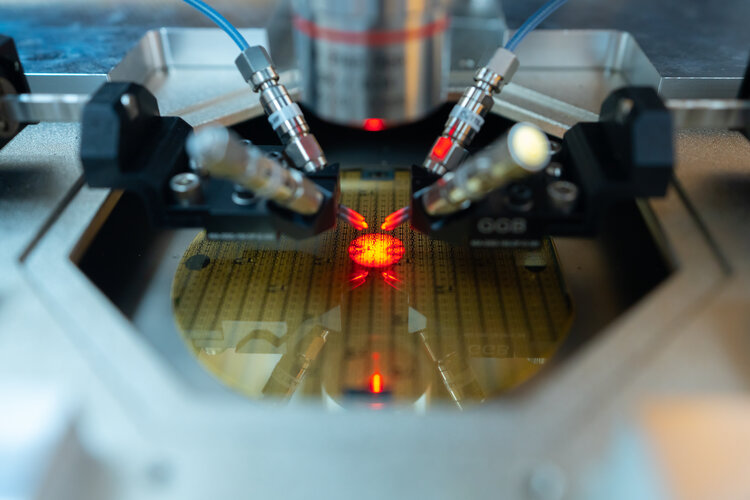
Copernical Team
Tuesday, 14 June 2022 12:30
Watch the ESA Council information session

The media information session following the 308th ESA Council will be streamed on 15 June from 12:40 to 13:15 CEST at esawebtv.esa.int. Join us to hear more about the cooperation between ESA and NASA.
Published in
News
Tagged under
Tuesday, 14 June 2022 14:05
NASA Invites Media, Public to View Webb Telescope’s First Images
 NASA, in partnership with ESA (European Space Agency) and CSA (Canadian Space Agency), will release the James Webb Space Telescope’s first full-color images and spectroscopic data during a televised broadcast beginning at 10:30 a.m. EDT on Tuesday, July 12, from NASA’s Goddard Space Flight Center in Greenbelt, Maryland.
NASA, in partnership with ESA (European Space Agency) and CSA (Canadian Space Agency), will release the James Webb Space Telescope’s first full-color images and spectroscopic data during a televised broadcast beginning at 10:30 a.m. EDT on Tuesday, July 12, from NASA’s Goddard Space Flight Center in Greenbelt, Maryland.
Published in
News
Tagged under
Tuesday, 14 June 2022 13:03
Going GaN: novel chips powering space missions

Some of ESA’s most ambitious future missions for telecommunications and Earth observation have only become possible because of a switch to a novel high-power and high-temperature capable semiconductor – sometimes termed the most promising material since silicon. ESA laboratory testing has confirmed the performance of key European-made Gallium Nitride components.
Published in
News
Tagged under
Tuesday, 14 June 2022 11:35
Difficult-to-observe effect confirms the existence of quark mass
Krakow, Poland (SPX) Jun 10, 2022
 A phenomenon that directly proves the existence of quark mass has been observed for the first time in extremely energetic collisions of lead nuclei. A team of physicists working on the ALICE detector at the Large Hadron Collider can boast this spectacular achievement - the observation of the dead cone effect.
The objects that make up our physical everyday life can have many different prope
A phenomenon that directly proves the existence of quark mass has been observed for the first time in extremely energetic collisions of lead nuclei. A team of physicists working on the ALICE detector at the Large Hadron Collider can boast this spectacular achievement - the observation of the dead cone effect.
The objects that make up our physical everyday life can have many different prope
 A phenomenon that directly proves the existence of quark mass has been observed for the first time in extremely energetic collisions of lead nuclei. A team of physicists working on the ALICE detector at the Large Hadron Collider can boast this spectacular achievement - the observation of the dead cone effect.
The objects that make up our physical everyday life can have many different prope
A phenomenon that directly proves the existence of quark mass has been observed for the first time in extremely energetic collisions of lead nuclei. A team of physicists working on the ALICE detector at the Large Hadron Collider can boast this spectacular achievement - the observation of the dead cone effect.
The objects that make up our physical everyday life can have many different prope
Published in
News
Tagged under
Tuesday, 14 June 2022 11:35
New feedback system can improve efficiency of fusion reactions
Plainsboro NJ (SPX) Jun 10, 2022
 Scientists at the U.S. Department of Energy's (DOE) Princeton Plasma Physics Laboratory (PPPL) have refined the use of magnetic fields to improve the performance of doughnut-shaped fusion facilities known as tokamaks. The improved technique protects internal parts from damage by instabilities called "edge-localized modes" (ELMs) and allows tokamaks to operate for longer without pausing.
"O
Scientists at the U.S. Department of Energy's (DOE) Princeton Plasma Physics Laboratory (PPPL) have refined the use of magnetic fields to improve the performance of doughnut-shaped fusion facilities known as tokamaks. The improved technique protects internal parts from damage by instabilities called "edge-localized modes" (ELMs) and allows tokamaks to operate for longer without pausing.
"O
 Scientists at the U.S. Department of Energy's (DOE) Princeton Plasma Physics Laboratory (PPPL) have refined the use of magnetic fields to improve the performance of doughnut-shaped fusion facilities known as tokamaks. The improved technique protects internal parts from damage by instabilities called "edge-localized modes" (ELMs) and allows tokamaks to operate for longer without pausing.
"O
Scientists at the U.S. Department of Energy's (DOE) Princeton Plasma Physics Laboratory (PPPL) have refined the use of magnetic fields to improve the performance of doughnut-shaped fusion facilities known as tokamaks. The improved technique protects internal parts from damage by instabilities called "edge-localized modes" (ELMs) and allows tokamaks to operate for longer without pausing.
"O
Published in
News
Tagged under
Tuesday, 14 June 2022 11:35
Earth's magnetic poles not about to flip
Lund, Sweden (SPX) Jun 10, 2022
 The emergence of a mysterious area in the South Atlantic where the geomagnetic field strength is decreasing rapidly, has led to speculation that Earth is heading towards a magnetic polarity reversal. However, a new study that pieces together evidence stretching back 9,000 years, suggests that the current changes aren't unique, and that a reversal may not be in the cards after all. The study is p
The emergence of a mysterious area in the South Atlantic where the geomagnetic field strength is decreasing rapidly, has led to speculation that Earth is heading towards a magnetic polarity reversal. However, a new study that pieces together evidence stretching back 9,000 years, suggests that the current changes aren't unique, and that a reversal may not be in the cards after all. The study is p
 The emergence of a mysterious area in the South Atlantic where the geomagnetic field strength is decreasing rapidly, has led to speculation that Earth is heading towards a magnetic polarity reversal. However, a new study that pieces together evidence stretching back 9,000 years, suggests that the current changes aren't unique, and that a reversal may not be in the cards after all. The study is p
The emergence of a mysterious area in the South Atlantic where the geomagnetic field strength is decreasing rapidly, has led to speculation that Earth is heading towards a magnetic polarity reversal. However, a new study that pieces together evidence stretching back 9,000 years, suggests that the current changes aren't unique, and that a reversal may not be in the cards after all. The study is p
Published in
News
Tagged under
Tuesday, 14 June 2022 11:35
Studying grassland from space
Leipzig, Germany (SPX) Jun 10, 2022
 The Sentinel-2 space mission began with the launch of Earth observation satellite Sentinel-2A in June 2015, and Sentinel-2B was launched in March 2017. Since then, these two satellites have been orbiting in space at an altitude of nearly 800 kilometres and, as part of ESA's Copernicus programme, providing data for, e.g., climate protection and land monitoring.
very three to five days, they
The Sentinel-2 space mission began with the launch of Earth observation satellite Sentinel-2A in June 2015, and Sentinel-2B was launched in March 2017. Since then, these two satellites have been orbiting in space at an altitude of nearly 800 kilometres and, as part of ESA's Copernicus programme, providing data for, e.g., climate protection and land monitoring.
very three to five days, they
 The Sentinel-2 space mission began with the launch of Earth observation satellite Sentinel-2A in June 2015, and Sentinel-2B was launched in March 2017. Since then, these two satellites have been orbiting in space at an altitude of nearly 800 kilometres and, as part of ESA's Copernicus programme, providing data for, e.g., climate protection and land monitoring.
very three to five days, they
The Sentinel-2 space mission began with the launch of Earth observation satellite Sentinel-2A in June 2015, and Sentinel-2B was launched in March 2017. Since then, these two satellites have been orbiting in space at an altitude of nearly 800 kilometres and, as part of ESA's Copernicus programme, providing data for, e.g., climate protection and land monitoring.
very three to five days, they
Published in
News
Tagged under
Tuesday, 14 June 2022 11:35
Isar Aerospace and EXOTRAIL partner on cloud-based simulation software ExoOPSTM
Munich, Germany (SPX) Jun 08, 2022
 The launch service provider Isar Aerospace signs in as the latest ExoOPSTM - Mission Design customer, Exotrail's Software-as-a-Service (SaaS) solution dedicated to space mission simulation and analysis.
Isar Aerospace, the leading European launch service provider focusing on small and medium satellite deployment, will use ExoOPSTM - Mission Design to answer the thriving demand for flexible
The launch service provider Isar Aerospace signs in as the latest ExoOPSTM - Mission Design customer, Exotrail's Software-as-a-Service (SaaS) solution dedicated to space mission simulation and analysis.
Isar Aerospace, the leading European launch service provider focusing on small and medium satellite deployment, will use ExoOPSTM - Mission Design to answer the thriving demand for flexible
 The launch service provider Isar Aerospace signs in as the latest ExoOPSTM - Mission Design customer, Exotrail's Software-as-a-Service (SaaS) solution dedicated to space mission simulation and analysis.
Isar Aerospace, the leading European launch service provider focusing on small and medium satellite deployment, will use ExoOPSTM - Mission Design to answer the thriving demand for flexible
The launch service provider Isar Aerospace signs in as the latest ExoOPSTM - Mission Design customer, Exotrail's Software-as-a-Service (SaaS) solution dedicated to space mission simulation and analysis.
Isar Aerospace, the leading European launch service provider focusing on small and medium satellite deployment, will use ExoOPSTM - Mission Design to answer the thriving demand for flexible
Published in
News
Tagged under
Tuesday, 14 June 2022 11:35
Unravelling the mysteries of clouds
Noordwijk, Netherlands (SPX) Jun 14, 2022
 Clouds and aerosols are still considered the great unknowns in understanding our climate. With the EarthCARE Earth observation satellite, Airbus has made the finishing touches to the crucial 'key' that will unlock the mysteries of clouds, helping make more accurate atmospheric models and climate forecasts.
The 2.3-tonne satellite is now being transported from the Airbus site in Friedrichsh
Clouds and aerosols are still considered the great unknowns in understanding our climate. With the EarthCARE Earth observation satellite, Airbus has made the finishing touches to the crucial 'key' that will unlock the mysteries of clouds, helping make more accurate atmospheric models and climate forecasts.
The 2.3-tonne satellite is now being transported from the Airbus site in Friedrichsh
 Clouds and aerosols are still considered the great unknowns in understanding our climate. With the EarthCARE Earth observation satellite, Airbus has made the finishing touches to the crucial 'key' that will unlock the mysteries of clouds, helping make more accurate atmospheric models and climate forecasts.
The 2.3-tonne satellite is now being transported from the Airbus site in Friedrichsh
Clouds and aerosols are still considered the great unknowns in understanding our climate. With the EarthCARE Earth observation satellite, Airbus has made the finishing touches to the crucial 'key' that will unlock the mysteries of clouds, helping make more accurate atmospheric models and climate forecasts.
The 2.3-tonne satellite is now being transported from the Airbus site in Friedrichsh
Published in
News
Tagged under
Tuesday, 14 June 2022 11:35
ReOrbit and VENG signs agreement for satellite manufacturing
Falda Del Carmen, Argentinia (SPX) Jun 10, 2022
 ReOrbit and VENG, an Argentinian-based company, signed an agreement to manufacture satellites in Argentina to serve the Latin America market. The directors of both organisations met at the Argentina Space Centre located in Cordoba Province, Argentina, to visit the VENG's AI&T facilities, discuss future collaborations and finally sign a Memorandum of Understanding.
VENG, the main contractor
ReOrbit and VENG, an Argentinian-based company, signed an agreement to manufacture satellites in Argentina to serve the Latin America market. The directors of both organisations met at the Argentina Space Centre located in Cordoba Province, Argentina, to visit the VENG's AI&T facilities, discuss future collaborations and finally sign a Memorandum of Understanding.
VENG, the main contractor
 ReOrbit and VENG, an Argentinian-based company, signed an agreement to manufacture satellites in Argentina to serve the Latin America market. The directors of both organisations met at the Argentina Space Centre located in Cordoba Province, Argentina, to visit the VENG's AI&T facilities, discuss future collaborations and finally sign a Memorandum of Understanding.
VENG, the main contractor
ReOrbit and VENG, an Argentinian-based company, signed an agreement to manufacture satellites in Argentina to serve the Latin America market. The directors of both organisations met at the Argentina Space Centre located in Cordoba Province, Argentina, to visit the VENG's AI&T facilities, discuss future collaborations and finally sign a Memorandum of Understanding.
VENG, the main contractor
Published in
News
Tagged under
